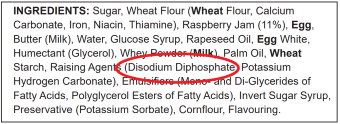Information for kidney patients who need to lower the phosphate levels in their blood.
Eating less phosphate from additives can help this.
Phosphate is often added to food by manufacturers as additives. This phosphate from additives gets into your blood stream more easily than the phosphate found naturally in foods. Phosphate additives can make your blood phosphate levels too high.
This information explains which foods have these additives and how you can avoid them, and which foods you can eat that don’t have phosphate additives.
Some foods are naturally high in phosphate (also known as phosphorous). You could eat less of these too. Ask your dietitian for advice about this.
How can I reduce phosphate additives?
To reduce the amount of phosphate additives you eat:
- Eat freshly cooked, unprocessed food more often.
- Check ingredient labels and limit foods with phosphate additives.
- Swap to brands without phosphate additives.
Why do I need to reduce the phosphate level in my blood?
When the kidneys are not working properly, the level of phosphate in the blood often rises too high. The normal range for blood phosphate is between 0.8mmol/l and 1.5mmol/l.
High levels of phosphate can cause:
- Hardening of blood vessels.
- Damage to your heart.
- Weak bones.
- Aching joints.
- Itchy skin.
How do I eat less phosphate additives?
If a food contains phosphate additives, you will see the name or E number on the ingredient label. Additives with “phos” in their name contain phosphate. You may be able to swap to a different brand without phosphate additives.
Check ingredient labels and try to avoid these additives:
| E number | Name | Where found |
|---|---|---|
| E338 | Phosphoric acid | Processed meats, sweets. cakes, chocolate, cola drinks. |
| E339 | Sodium phosphates | Dried milk powder, canned soup, breaded chicken and fish, UHT products |
| E340 | Potassium phosphates | Processed meats and cheeses, sports drinks, dried milk powder. |
| E341 | Calcium phosphates | Shop-bought desserts and powder dessert mixes, instant pasta mixes. |
| E343 | Magnesium phosphates | Bakery products, liquid egg, salt, substitutes. |
| E450 | Diphosphates | Bakery products, processed meat and cheeses, soups and sauces. |
| E451 | Triphosphates | Processed cheese, icing sugar, flavoured syrups. |
| E452 | Polyphosphates | Processed potato products. |
To help you avoid phosphate additives, here are some examples of food labels. They show how phosphate additives are listed on the packaging.
Sausages

Cake

If food contains phosphate additives try checking similar options to find one without.
What foods can I eat?
By choosing fresh, unprocessed foods where possible, you can reduce the phosphate additives you are eating. This will help to you lower your blood phosphate levels.
Here are some suggestions for swaps:
| Foods commonly containing phosphate additives | Suitable swaps - but always check labels |
|---|---|
| Ham. chicken, or turkey slices. | Home cooked cold meat, chicken, or turkey. Or brands without phosphate additives. |
| Processed cheese spreads or dips. | Flavoured or plain cream or cottage cheese. |
| Processed cheese slices, cheese triangles. | Cheddar cheese or another hard cheese. |
| Naan bread, crumpets. | Tortilla wraps, pitta bread, bread or English muffins. |
| Muffins, scones, sponge cakes. | Fresh fruit, iced buns, fruit teacakes, hot cross buns, jam tarts, meringues, croissants, shortbread, digestive, and rich tea biscuits. |
| Cola drinks. | Water, fruit squash, flavoured water, lemon or orangeade, non-alcoholic ginger beer. |
It can be difficult to find processed meat without phosphate additives. Your dietitian can guide you on processed meats without additives available where you normally shop.
Eating less red and processed meat is recommended for us all as they are linked with causing bowel cancer. They are also high in fat and salt. For healthier, lower phosphate options, see the NHS websites on the next page.
How can I eat more sustainably?
Many people want to eat food that is more environmentally friendly. These are good ideas for the planet and for you too:
- Limit red and processed meats. Try some plant food sources of protein such as beans, lentils, soya mince, Quorn, and tofu instead.
- Moderate the amount of dairy foods you eat and consider a plant-based milk.
- Eat less processed food that is high in fat, sugar, and salt.
Summary
This page has shown you ways you can eat less phosphate from food additives by:
- Eating freshly cooked, unprocessed food more often.
- Checking labels for phosphate additives, and limiting foods with phosphate additives.
- Swapping brands to avoid phosphate additives.
Useful webpages:
For guidance on healthy amounts of meat to help reduce your risk of bowel cancer:
Meat in your diet - NHS (www.nhs.uk)
Information on kidney disease and food written by the kidney dietitians at North Bristol NHS Trust:
Nutrition & Dietetics Patient Information (Kidney Disease) | North Bristol NHS Trust (nbt.nhs.uk)
Recipes to enable you to cook delicious kidney friendly meals from scratch:
Practical advice to help you reduce your weekly food shopping bill while maintaining a nutritious and kidney friendly diet:
Shop for a kidney friendly diet on a budget | Kidney Care UK
© North Bristol NHS Trust. This edition published May 2024. Review due May 2027. NBT003616.
